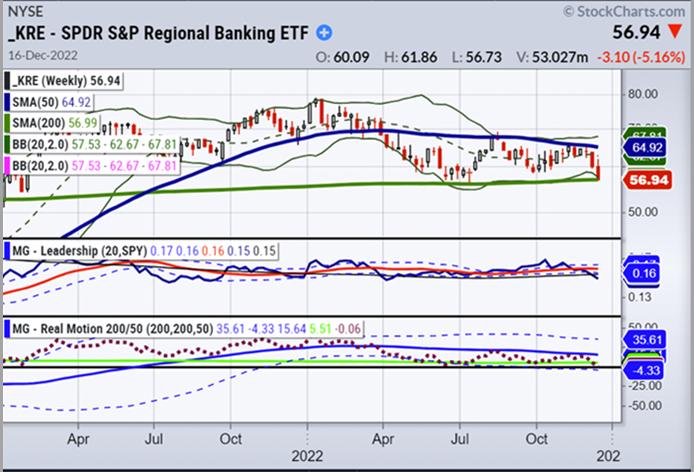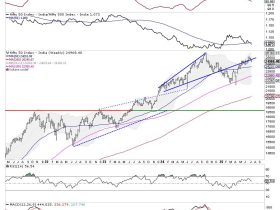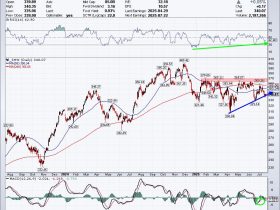KRE is a key member of Mish’s Modern Family, because KRE measures the health of not only the US financial system, but the overall economic activity of rural America.
Regional banks have performed relatively well compared to larger, more prominent banking institutions over recent years. This year, though, Regional Banks (represented above by KRE, the SPDR S&P Regional Banking ETF) have declined steadily and underperformed Wall Street.
KRE tested pre-COVID price levels in July and is now retesting these lows. It is close to making a new 52-week low and is barely holding above the 200-week moving average, which it last crossed in March 2020. This key area of support might present an opportunity for investors.
Regional banks are much cheaper now, and value is leading growth these days. Early in 2023, regional banks could potentially see a “mean reversion” trade.
The chart above displays the Regional Banking price spread over Wall Street Financiers since 2018. KRE represents regional banks, and more prominent banking institutions are represented by the Financial Select Sector SPDR Fund (XLF). The price gap between these valuations is wide, and the ratio illustrates the dramatic underperformance of regional banking stocks relative to the broader financial sector. As this ratio moves lower, KRE is underperforming, and XLF is gaining. We can’t predict when KRE will regain price strength, but rising interest rates, loan growth, and potential M&A activity favor a possible mean reversion.
Regional banks represent a large part of the country’s banking system by assets and play a crucial role in the US economy, as they support capital lending in rural America, employment growth, and small company expansion. The rise of big banks and their vast investments have allowed them to expand market share at an unimaginable scale. But just because these titans dominate the banking industry doesn’t mean they will continue to do so.
Recession fears and high inflation have weighed on KRE, but rising interest rates have historically been good for regional banks. They provide the loans that small businesses need to expand and create jobs. And they offer a place for individuals to park their savings, which helps fuel consumer spending.
Regional banks are reliable indicators of the economy’s overall health. It is crucial to keep an eye on KRE price levels for a potential mean reversion trade in 2023.
KRE represents a crucial link between Main Street and Wall Street. As we enter an era of rising interest rates and higher inflation, it is essential to monitor the health of regional banks so that you can position your trading for success.
If you want to take advantage of our proprietary trading indicators, contact Rob Quinn, our Chief Strategy Consultant, who can provide more information about Mish’s Premium Trading Service. Click here to learn more about Mish’s Premium trading service with a complimentary one-on-one consultation.
“I grew my money tree and so can you!” – Mish Schneider
Get your copy of Plant Your Money Tree: A Guide to Growing Your Wealth and a special bonus here.
Follow Mish on Twitter @marketminute for stock picks and more. Follow Mish on Instagram (mishschneider) for daily morning videos. To see updated media clips, click here.
Mish in the Media
In this appearance on Real Vision, Mish joins Maggie Lake to share her view of the most important macro drivers in the new year, where she’s targeting tradeable opportunities, and why investors will need to keep their heads on a swivel. Recorded on December 7, 2022.
Mish sits down with CNBC Asia to discuss why all Tesla (TSLA), sugar, and gold are all on the radar.
Read Mish’s latest article for CMC Markets, titled “Two Closely-Watched ETFs Could Be Set to Fall Further“.
Mish talks the current confusion in the market in this appearance on Business First AM.
Mish discusses trading the Vaneck Vietname ETF ($VNM) in this earlier appearance on Business First AM.
ETF Summary
S&P 500 (SPY): The 50-WMA looms above with resistance at 410; unless that level is cleared, SPY could fall to the 50-DMA support level at 380.Russell 2000 (IWM): 170 support and 176 resistance.Dow (DIA): 324 first level of support and 334 first level of resistance. The only index above its 50-WMA; Tuesday’s action may have spawned a key reversal top if DIA cannot reach 348 again.Nasdaq (QQQ): Matched recent highs at 297 before selling off; 270 is support and 278 first level of resistance.Regional Banks (KRE): 57 support was pivotal; now support is 53 and resistance is 57-59.Semiconductors (SMH): Support is 210, resistance is 216.Transportation (IYT): Ran to its 50-WMA and sold off; 218 still pivotal support, 213 lower support; 223 is now resistance (was support).Biotechnology (IBB): Best sector in a consolidation mode, unless it breaks below 130. 130 is pivotal support, 139 resistance.Retail (XRT): Never cleared over 67; we were watching 63 as major support. No pivotal support at 60; 63 is now resistance and 65 is 2nd level of resistance.
Mish Schneider
MarketGauge.com
Director of Trading Research and Education
Wade Dawson
MarketGauge.com
Portfolio Manager








